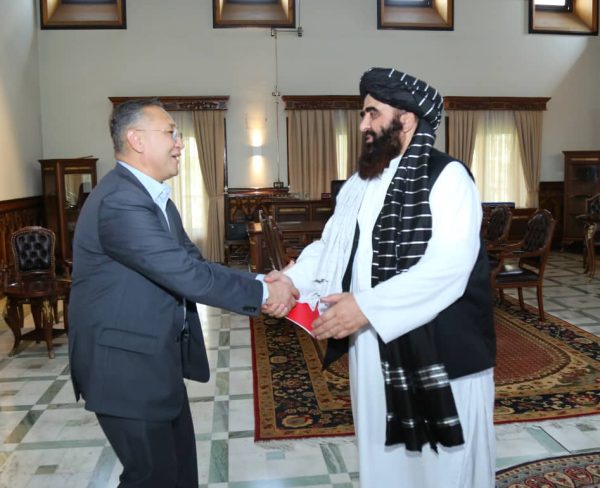
Two high-ranking Kyrgyz officials have apparently met with the Taliban government’s acting Minister of Foreign Affairs Amir Khan Muttaqi. The deputy chairman of Kyrgyzstan’s Security Council, Taalatbek Masadykov, and the head of the Kyrgyz presidential administration’s foreign policy department, Jeenbek Kulubaev, met with Taliban officials in Kabul, according to a Taliban spokesman.
Earlier this month, speaking at the summit of Collective Security Treaty Organization (CSTO) leaders, Kyrgyz President Sadyr Japarov noted the necessity of conducting dialogue with representatives of the new government in Afghanistan, the Taliban. Although the Kyrgyz government has not commented on the meeting yet, it is not surprising. The states of Central Asia are working to calibrate their relations with the new powers-that-be in Kabul according to their interests, and also those of their major partners, China and Russia.
Taliban spokesman Zabihullah Mujahid tweeted pictures of the meeting, commenting that Muttaqi welcomed the Kyrgyz officials “and thanked them for their assistance. He also stressed the need for continued cooperation and assistances,” per RFE/RL. The focus of the meeting, he wrote, was bilateral relations and continued cooperation.
Kyrgyzstan does not share a border with Afghanistan, but the country did host a major U.S. air base and transit center at Manas International Airport outside the capital, Bishkek, from December 2001 to June 2014.
The base was particularly important to the U.S. and NATO mission, especially during the Obama administration’s “surge,” which saw U.S. force levels in Afghanistan reach 100,000. It was also a convenient leveraging tool for successive Kyrgyz administrations vis-a-vis Russia, which also had (and still has) an air base outside the Kyrgyz capital, at Kant. As Alexander Cooley recounted to the Washington Post in 2013 after the U.S. announcement that it would be exiting the facility at Manas, “In the winter of 2009 [Kyrgyz President Kurmanbek] Bakiyev also engineered a brash base-bidding war between Moscow and Washington”:
At a press conference held with Russian president Dmitri Medvedev, Bakiyev announced that he would close the base, but just a few weeks later, after receiving an initial payment from Moscow, he went ahead and renegotiated the current lease with Washington, renaming the facility a “Transit Center” and increasing the annual rent paid by the United States from $17 million to $60 million.
The base saga illustrates a shrewdly practical approach, if a bit of a swindling one, too. In that vein, Kyrgyz engagement with the Taliban will be guided by practical concerns and the consensus of Kyrgyzstan’s partners in the CSTO and Shanghai Cooperation Organization (SCO).
Kyrgyzstan’s recent diplomacy with regard to the Taliban has never been as robust as that of neighboring Uzbekistan, but it has also not been as potentially antagonistic as that of Tajikistan. Like most regional leaders, Japarov has used language urging the formation of an “inclusive” government in Afghanistan, but also like most, the Kyrgyz president has not detailed his definition of inclusivity or a timeline for achieving it.
Meanwhile, this week at a conference focused on regional security and Afghanistan, Kyrgyzstan’s ombudsman Tokon Mamytov reportedly said that threats to the region don’t come from the Taliban but rather “armed gangs.” Mamytov said that the Taliban are not interested in interfering with the internal affairs of the Central Asian states.

0 Comments